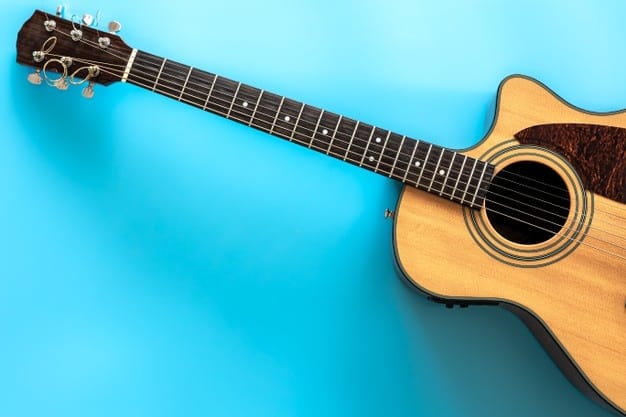Acoustic guitars with a pre-amp are a great boon, but like everything else, they come with a catch which in this case is the battery.
Typically, these batteries can last for a while with reasonable use.
These acoustic guitars are great for live performances as they can be directly hooked up to a sound system.
However, the last thing any guitarist would want is the battery to run out in the middle of a performance.
There are a few things that can help avoid such a situation which is what I am going to explore here.
But if you just want a quick definitive answer to this question, here it is:
How long the battery of an acoustic guitar will last depends ultimately on how much you play. Assuming you practice every day for an hour, plugged in on average, batteries should last for 3 months or more. Playing unplugged won’t drain your battery, but leaving your guitar cable connected will do.
If you want to dive deeper into the topic, please stick around!
Factors that make your acoustic guitar battery drain faster
There are a few factors that will drain an acoustic guitar battery faster, and here are some of them:
Output Level
The battery’s primary function is to provide power to the electronic circuit that converts the sound produced by the guitar’s strings into an electric signal. The volume of this signal can be controlled by the volume knob of the pre-amp. Cranking this volume up high will cause the battery to drain faster.
Duration Of Usage
This is a no-brainer. The longer the guitar is used, the faster the battery will drain. There is, however, a lesser-known practice that still comes under the battery “usage” category. Leaving a guitar plugged in will also eat into the battery’s life even if the guitar is not being played.
Battery Type
Lithium-ion batteries last longer than alkaline batteries. Similarly, batteries from reputed brands tend to last longer. Batteries that have been in storage for a long time will drain faster than fresh batteries as well.
Weather
Warmer temperatures cause batteries to degrade faster. So, if the guitar is used in a place where the temperature can soar, the battery life will be lower than expected.
How to make your acoustic guitar battery last longer?
The battery in an acoustic guitar can be made to last longer by following a few simple steps
- Unplug the guitar when you are not using it
- Keep the output volume low
- Use a high-quality battery
- Store the guitar in a cool, dry place
Are there rechargeable 9V batteries?
There most certainly are rechargeable 9V batteries, but the bigger question would be if you need them.
Rechargeable batteries are great in power-hungry applications where the battery can be drained in hours or a couple of days.
The acoustic guitar usually does not present such a use case.
Rechargeable batteries and their power adapters will be significantly more expensive than their non-rechargeable counterparts.
Since a good quality battery can last a few months under normal operating conditions, a rechargeable battery doesn’t necessarily offer any significant advantages.
It all then comes down to personal choice and your budget.
It is also worth noting that rechargeable batteries will degrade with time and will start getting drained faster with time and repeated charging-discharging cycles.
Either way, if you are interested in a rechargeable battery for your guitar, try getting one from a reputed brand.
How often should you change your acoustic guitar battery
As alluded to previously, there are a lot of factors that can affect the operational lifetime of a battery.
However, a good-quality 9V battery can be reasonably expected to last for 100 hours.
Depending on how often the guitar is used and how high the volume of the pre-amp is set, the battery can be drained in a matter of days.
However, assuming a use-case of about 60 minutes every day, the battery in an acoustic guitar can last for more than three months.
If played less frequently, the battery will obviously last longer.
When a battery does need to be changed, it will offer up some telltale signs.
If the sound cuts out or the output signal isn’t loud enough, it means that the battery needs to be replaced.
Please do not wait for the battery to be completely dead as it can potentially leach harmful chemicals into the battery compartment damaging the circuitry.
The same applies to a guitar that is left unused.
Remove the batteries if the guitar will not be used for more than two weeks at a stretch.
If the primary cause for concern is running out of battery in the middle of a performance, then a healthy practice would be to always change the battery before an important performance.
Save the batteries that are removed to be used in practice or at home when running out of a battery won’t be an issue.
Can anyone change the battery in an acoustic guitar?
Yes, they can.
In almost every acoustic guitar that comes with a pre-amp, changing the battery is extremely easy.
It does not require any tools and can be done by even a complete novice.
Simply locate the battery compartment, which should be fairly easy.
Use the release mechanism on the door of the battery compartment, and that should give access to the battery itself.
Take the battery out.
Align the leads of the new battery.
These two should be easy as it will be clearly marked which side the negative and positive terminals have to go.
Close the compartment back, and that is it.
What happens if my acoustic guitar runs out of battery?
The acoustic guitar isn’t one of those things that will suffer catastrophic damage if the battery gets discharged.
The only thing that will happen is that the preamp section won’t work anymore.
This means that it cannot be plugged into an external sound system.
However, the guitar will still work acoustically.
The strings will produce a sound, and this sound can be amplified with the use of a microphone like any other acoustic instrument.
Passive pickups: An alternative if you don’t want to worry about batteries
If you really hate having to deal with batteries and want a solution that will still allow you to connect the guitar to a sound system directly, then passive pickups could be something that you can look into.
Passive pickups, or often called “magnetic pickups” are pretty similar to what you could find on an electric guitar.
They are usually attached to the soundhole of the guitar and don’t require drilling or destructive work on the instrument.
From the pickup runs a cable that allows you to plug just about anywhere and get your sound amplified.
This type of pickup generates a magnetic field (hence its name) that senses the vibrations of the strings and translates them into an electric signal.
The catch here is that they don’t sound like any other kind of acoustic-specific pickup, but as with everything, there are tradeoffs.
If you want to know more about the different kinds of acoustic guitar pickups there are, you should check out this article:

Hello there, my name is Ramiro and I’ve been playing guitar for almost 20 years. I’m obsessed with everything gear-related and I thought it might be worth sharing it. From guitars, pedals, amps, and synths to studio gear and production tips, I hope you find what I post here useful, and I’ll try my best to keep it entertaining also.





